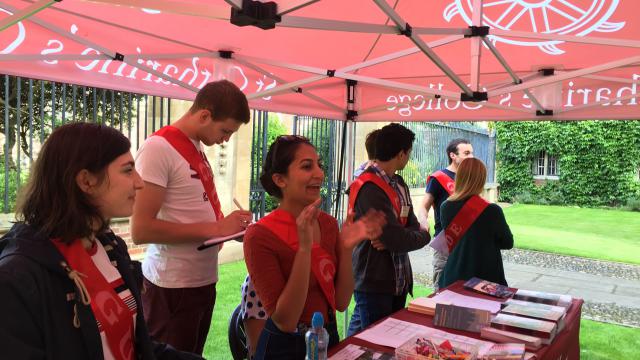Name: Rachel Jackson
Hometown: North Berwick, Scotland, UK
Extracurricular interests: Horse riding, training horses and competing in equestrian competitions (dressage and jumping)
Postgraduate degree: PhD in medicine
Life before Catz
“I did my undergraduate degree in Mathematics and Biology as a joint degree at the University of Edinburgh. I chose this combination because I thought this degree would help me to develop the skills to handle large quantities of data, with a view to pursuing molecular biology as a PhD student. Fortunately, I really enjoyed both subjects as an undergraduate, and I realised how much I liked working on molecular mechanisms.
“I applied to Cambridge because of the strong reputation for life sciences and a high density of world-class biology labs and institutes – one of which I’m now based in (the Cambridge Institute for Medical Research). My goal is to harness my training in mathematics, computational approaches, and molecular biology to participate in cross-disciplinary research. I want to provide insights into the underlying molecular biology of how our cells fight disease, with the potential to lead to novel therapies.”
Life at Catz
“I applied when COVID restrictions were still in force, so there were no open days on offer and I had to base my choice of college on online research. It was clear that Catz had a strong connection with the Harding Distinguished Postgraduate Scholars Programme. It also had a reputation for being very friendly and a high percentage of state school admissions, both of which suggested that someone like me might fit in.
“One of the best things about being a student at Catz has been the welfare support and openness around mental health. The Health & Wellbeing team is excellent and have been extremely responsive when I reached out to them. They organised counselling for me that I don’t think I would have had access to at the time if I’d been at another college. I appreciate how the Catz community manages to be both very academic and very supportive – a difficult balance to strike!
“When participating in equestrian competitions, I’ve really felt the difference that the University facilities and coaching have made. I have also received two sports bursaries from Catz to help cover my expenses, which have helped significantly and been more generous than team-mates from other colleges have been able to access.”
Postgraduate studies
“I am interested in how pathogens interact with human cells to cause disease. Orientia tsutsugamushi is an intracellular bacterium which causes scrub typhus. This mite-borne infection is responsible for an estimated one million cases each year and is a leading cause of non-malarial febrile illness in South and South East Asia. There are limited options for clinically practical diagnostic tests for scrub typhus, which is predominantly endemic in rural areas. In addition to this, natural immunity is not long lasting and very limited across different strains as there is a high degree of antigenic variability. In one infection, a person may be infected with multiple strains, further limiting the effectiveness of existing immunity.
“The life-cycle of Orientia tsutsugamushi breaks almost every rule in the book when it comes to bacteria, and involves differentiation of the bacterium from the intracellular state localised in a perinuclear localised microcolony, to the extracellular state which buds from the surface of cells in a virus-like manner. Previous data from the Salje lab indicates that these states have differences in protein expression. However, a global approach has not yet been taken to characterise these distinct states. Utilising spatial transcriptomics and proteomic approaches, the aim of my PhD project is to (1) define the distinct subpopulations of Orientia tsutsugamishi within an infected cells, and (2) characterise the key factors which drive this differentiation. Understanding the life cycle of Orientia tsutsugamushi should aid the development of diagnostics and vaccines for scrub typhus.”
The Harding Distinguished Postgraduate Scholars Programme
“I have benefitted from the training and development opportunities the Harding programme offers, such as sessions on public speaking and writing skills. I have already presented my work at the internal speaker events organised by the Programme, where scholars asked me some great questions about my project. I also had the chance to hear about the diverse research being conducted by other scholars, even finding parallels with other disciplines such as astrophysics when it comes to image segmentation and data analysis.
“The active social side of the Programme has been fantastic. It has been great to meet informally with other scholars who are equally engaged and passionate about their PhDs.
“In addition, the generous personal research allowance has enabled me to retain memberships of learned societies in my field (the Microbiology Society, the Genetics Society and the British Society for Cell Biology). Thanks to this allowance, I will be travelling in February 2024 to the Mahidol Oxford Tropical Medicine Research Unit in Bangkok, Thailand, to learn new experimental techniques.”
Advice for undergraduates thinking of applying for postgraduate studies
“Don’t be scared to approach principal investigators as it is essential to get to know them and their research before you apply. It is equally important to talk to their team to find out if their particular culture and lab environment will work for you. Work-life balance is really important – and even helps productivity – so find out if this is valued by the lab and what extracurricular activities are on offer at different universities.”






